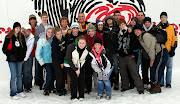 Caricature by John Cox (coxandforkum.com)
Caricature by John Cox (coxandforkum.com)I couldn't help but to take a long lunch on Monday to take in the speech and subsequent Q & A forum with the Iranian President, Mahmoud Ahmadinejad, at Columbia University in New York.
There was a great deal of popular chagrin directed toward Columbia University's president, Lee Bollinger (formerly the top brass at the University of Michigan), after he extended an invitation to the "terror of Tehran" to coincide with his trip to speak in front of the United Nations.
For those who defended the actions of Bollinger, the buzz phrase was "freedom of speech"; that somewhat fickle argument just doesn't do it for me--not now, not ever.
Simply put, there is nothing intrinsically good about exercising rights--this is a significant philosophical mistake. Ahmadinejad certainly had the right to speak, and Columbia had the right to invite him to their campus; but, that's not "what's great about America" as so many are prone to say.
What's great about American is that we have those rights. Try having an academic forum in Iran with President Bush or Ehud Olmert. Professors in Tehran don't even have the right to criticize their own leadership. And, those who have attempted to do so have been dealt with harshly (see the "new cultural revolution" that began after his 2005 election).
Disinviting the Iranian President would not have signified anything other than grace under fire (and, it is helpful to remember, something that they've done before). It was a mistake for Bollinger to bring the head of a rogue nation to his campus on a few fronts:
1.) Iran is a terrorist state
One would think that this alone would make him exempt from using one of our country's most presitigious universities as a platform for his tripe. Iran is funding what amounts to a proxy war against coalition (mostly American) forces in Iraq. Further, Iran funds one of the world's most notorious terror groups--Lebanon's Hezbollah.
This is to say nothing of Iran's ruthless domestic policies that repress Muslims and non-Muslims alike (read about people of the Baha'i faith and their treatment in Iran). Women are persecuted (imprisoned for not being covered from head-to-floor*), homosexuals (which Ahmadinejad claims do not exist in Iran--"I don't know who told you that they did...") are executed and there is no such thing as a free press (for a contemporary example of this fact, read about the speech in the state-run press in Iran and all the "standing ovations...")
Ahmadinejad is packing prisons full of dissidents in an apparent effort to reignite the "moral" fervor that brought about Iran's Islamic Revolution under the infamous Ayatollah Khomeini. So, we should not be surprised, then, to see hangings making a return to public life (and, in many cases, you don't even have to leave the living room to watch them). And not just hangings, but stonings that normally involve women being buried up to their necks and, in some cases, in the presence of their children.** This practice has, ostensibly, been in moratorium in Iran since 2002, but evidence suggests otherwise (see Amnesty International report).
2.) PR
In the eyes of the public, Columbia could scarcely look worse. He alienated nearly everyone with any connection to the school, especially the school's Jewish community. (A relationship that may be bruised forever after Bollinger confessed that he would have offered a similiar forum to Hilter in the 1930s. As if Ahmadinejad's own words about wiping Israel "off the map" weren't enough to cause some derision.)
In an effort to be seen as a strict cosmopolitan, the milquetoast academic made the mistake that will inevitably become his legacy as president of the university.
3.) Academic Integrity
To call the forum with Ahmadinejad an "academic" forum is a total misuse of the term. Bollinger played the role of chickenhawk as he kowtowed to the furious masses by taking cheap shots at his guest BEFORE he had even spoken a word. It looked like a desperate attempt by the president to score points with a disgusted populace.
Further, had Bollinger done any research into his guest's track record, he would have known that Ahmadinejad DOES NOT ANSWER QUESTIONS. Ahmadinejad's schtick hasn't been considered academic since Plato went about impersonating Socrates nearly 2400 years ago.
Bollinger, then, simply gave him a platform from which to speak his unenlightened rot.
Studying propaganda is academic; producing it is not.
Ahmadinejad, apparently, is a master of illusions as evidenced by the applause (much more than a smattering) he received from many of the 600 in attendance at Columbia. The fact that Ahmadinejad is a puppet of the mullahs and ayatollahs in his country doesn't make him any less dangerous. It is clear that he is making every attempt to build consensus in the world against the "arrogant powers"--the United States, Israel, Britain and, before long, Sarkozy's France.
And, thanks to some strange historical phenomenon, people are listening.
Ahmadinejad's appeal to the non-aligned countries of the world during his speech before the United Nations is every bit as scary as it is transparent. Iran is bloc-building, preying upon the empty-headed anti-American hysteria that exists in some parts of the world.
And, as is now clear after the Columbia debacle, we now live in one of those parts.
Keep churning out your allied lemmings, Lee. Their prestigious degrees will make for impressive sandwich boards one day.
*Indeed, even hospitals in Iran have been directed to refuse aid to women who do not meet the strict code of dress. (See "Islamic Republic of Fear", in the Economist (August 23, 2007)
**"Rules also specify the size of the stones which can be thrown so that death is painful and not imminent." (IPS News, September 29, 2006)









.jpg)








